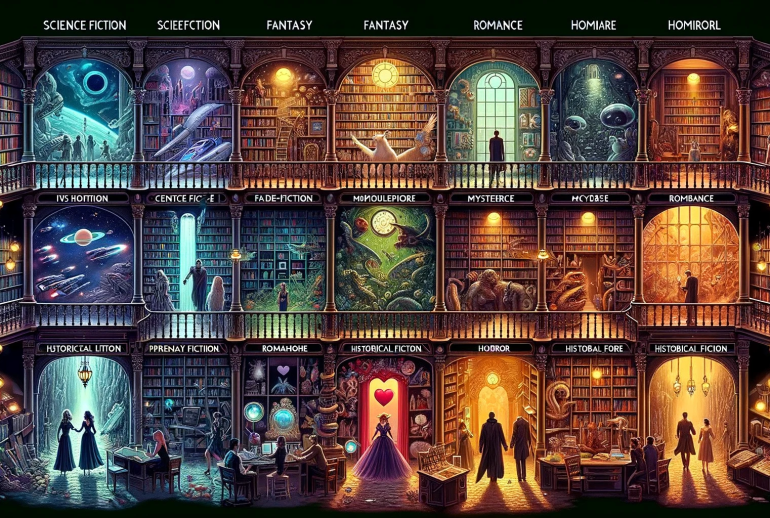Writing is an art form as diverse as the human imagination. Among the many facets of this creative endeavor, one of the most critical decisions an aspiring author can make is choosing the right genre. It’s akin to selecting the canvas and paintbrushes for a masterpiece. The chosen genre shapes the story’s tone, style, and even its intended audience. In this comprehensive article, we’ll embark on a journey of genre exploration, delving into various genres of fiction and helping aspiring authors determine which one aligns best with their interests and strengths.
The Importance of Genre Selection
Before we dive into the world of genres, it’s essential to understand why genre selection matters. Your chosen genre not only guides your writing but also influences your potential readership and your success as an author. Here’s why it’s so crucial:
-
Reader Expectations: Different genres come with specific conventions, tropes, and reader expectations. Readers who enjoy one genre may not be interested in another. Choosing the right genre ensures you attract the right audience.
-
Creative Fulfillment: Writing within a genre that resonates with you personally can lead to more fulfilling and passionate storytelling. When you write what you love, it shows in your work.
-
Marketability: Understanding the market demand for your chosen genre is essential for authors seeking commercial success. Certain genres may be more marketable than others at specific times.
-
Genre Blending: Many authors choose to blend genres to create unique and innovative works. Understanding your primary genre can help you navigate the complexities of blending effectively.
Now, let’s embark on our genre exploration journey, starting with some of the most popular genres in fiction.
1. Mystery: Unraveling the Unknown
Characteristics: Mystery novels revolve around solving a central enigma or crime. They often feature detectives, amateur sleuths, or ordinary individuals thrust into extraordinary circumstances. The plot centers on uncovering secrets and finding answers.
Is It for You? If you enjoy puzzles, riddles, and the thrill of solving mysteries, this genre might be your calling. Mystery novels require a knack for suspense and a talent for weaving intricate plots.
2. Science Fiction: Exploring the Future and Beyond
Characteristics: Science fiction transports readers to futuristic or speculative worlds, often exploring technological advancements, alien civilizations, and the impact of science on society. It encourages imaginative world-building and futuristic concepts.
Is It for You? If you’re fascinated by the possibilities of future technologies, space exploration, and societal change, science fiction offers a vast playground for your creativity.
3. Fantasy: Magic, Myths, and Legends
Characteristics: Fantasy delves into magical realms, mythical creatures, and epic quests. It often features elements like wizards, dragons, elves, and enchanted lands. The genre allows for limitless creativity in building fantastical worlds.
Is It for You? If you love escaping into mythical landscapes, creating unique magical systems, and crafting tales of heroism and adventure, fantasy may be your realm of choice.
4. Romance: Matters of the Heart
Characteristics: Romance novels focus on the development of romantic relationships between characters. They explore themes of love, passion, and human connections. Romance can be found within other genres as a subgenre as well.
Is It for You? If you’re drawn to matters of the heart, enjoy creating engaging characters with intense chemistry, and believe in the power of love stories, romance could be your genre of choice.
5. Historical Fiction: A Glimpse into the Past
Characteristics: Historical fiction transports readers to specific time periods, often featuring real historical events or figures. It requires meticulous research and attention to historical accuracy.
Is It for You? If you have a passion for history, enjoy immersing yourself in the past, and relish the challenge of recreating historical settings, historical fiction offers a rich and immersive experience.
6. Thriller/Suspense: Heart-Pounding Tension
Characteristics: Thrillers and suspense novels are known for their high-stakes plots, suspenseful pacing, and heart-pounding tension. They often feature protagonists facing danger, crime, or imminent threats.
Is It for You? If you thrive on keeping readers on the edge of their seats, crafting intricate plots with unexpected twists, and delving into the psychology of fear and suspense, this genre may be your forte.
7. Young Adult (YA): Navigating Adolescence
Characteristics: Young Adult fiction caters to a teenage audience and explores the challenges, growth, and coming-of-age experiences of young protagonists. It encompasses various genres within its scope.
Is It for You? If you resonate with the adolescent experience, enjoy writing from a youthful perspective, and tackle themes of identity, growth, and self-discovery, YA fiction provides a vibrant platform.
8. Horror: Unleashing Fear
Characteristics: Horror literature aims to terrify and unsettle readers, often delving into supernatural or psychological horrors. It explores the darkest aspects of the human psyche and the unknown.
Is It for You? If you revel in inducing spine-chilling fear, crafting unsettling atmospheres, and exploring the macabre, the horror genre may be your realm of choice.
9. Dystopian: Imagining Dark Futures
Characteristics: Dystopian fiction portrays bleak and oppressive future worlds, often characterized by totalitarian regimes, societal collapse, or post-apocalyptic settings. It explores the consequences of human actions and choices.
Is It for You? If you’re intrigued by speculative futures, enjoy exploring thought-provoking social commentary, and envisioning the consequences of current trends, dystopian fiction offers a gripping canvas.
10. Literary Fiction: Exploring the Human Condition
Characteristics: Literary fiction delves deep into the complexities of human relationships, emotions, and the human condition. It often focuses on character development, introspection, and intricate prose.
Is It for You? If you have a passion for introspection, poetic language, and exploring the nuances of the human experience, literary fiction provides a profound and introspective platform.
Choosing Your Genre: A Personal Odyssey
Selecting the right genre is a deeply personal and often introspective process. Here are some steps to guide you in finding your ideal writing path:
-
Explore Your Interests: Consider your passions, hobbies, and the themes that resonate with you. Your enthusiasm will fuel your creativity.
-
Read Widely: Dive into various genres to get a feel for their unique characteristics and storytelling styles. Pay attention to what excites you as a reader.
-
Reflect on Your Strengths: Assess your writing strengths, whether it’s crafting intricate plots, developing relatable characters, or creating vivid settings.
-
Experiment: Don’t be afraid to experiment with different genres in your writing. You might discover unexpected strengths and interests along the way.
-
Seek Feedback: Share your work with writing peers or mentors who can provide insights into your writing style and genre suitability.
-
Stay Open-Minded: Remember that your genre choice is not set in stone. As you grow and evolve as a writer, your preferences may change.
Conclusion: Your Literary Odyssey Begins
Genre exploration is an essential step in a writer’s journey, akin to setting the compass for a grand literary odyssey. Your chosen genre will guide your storytelling, but it’s important to remember that writers often transcend boundaries and blend genres to create unique narratives.
The world of fiction is vast and ever-evolving, offering endless opportunities for creativity. Whether you find your voice in mystery, science fiction, romance, or any other genre, your unique perspective and storytelling abilities will shape your path as an author. Embrace the adventure, trust your instincts, and embark on your literary odyssey with passion and purpose. Your readers are waiting for your stories, and your journey as a writer has only just begun.



